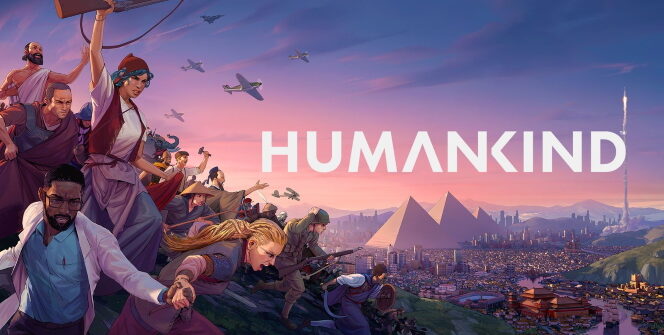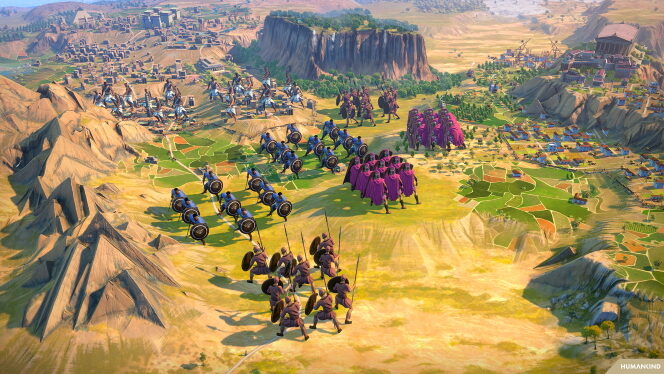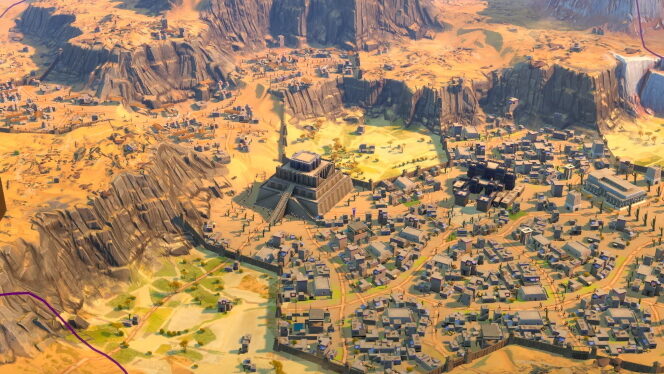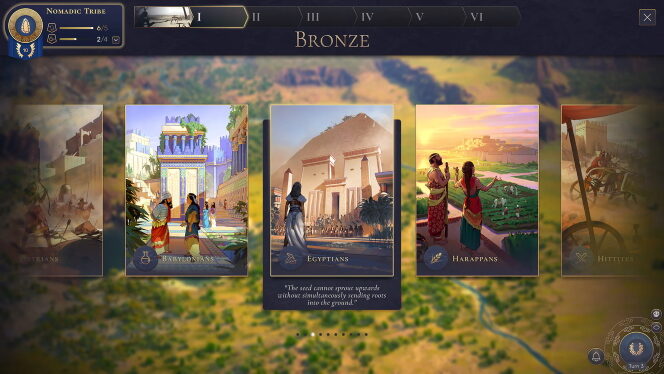REVIEW – Sid Meier’s Civilization series is an inescapable part of the history of the so-called “4X” games (“eXplore, eXpand, eXploit and eXterminate”). It is safe to say that with the release of the first instalment in 1991, it created a new genre; it rightly made its mark in the video game industry’s history. Does Humankind, this late epigone, live up to the reputation of its great predecessors? Read on to find out!
The very existence of Humankind proves that there’s something genuinely fascinating about games with a historical theme – especially when that concept is coupled with the utmost freedom. Rebuild, change the past, civilise, build an empire, conquer the world… who doesn’t want to do that every now and then? Some people might think it is megalomania, but it’s just an example of the limitlessness of human curiosity and creativity. We yearn to change the past, to make the world in our own image, just as humanity collectively did with the Earth. Whether this latter phenomenon is good or bad, I stress, is beyond the scope of this article, but it is remarkable as a fact.
As mentioned in the introduction, Sid Meier’s game has created a genre, and Civilization has had six episodes (not to mention the many add-ons, DLCs, etc.); however, the last episode has been out for almost six years. Amplitude Studios, a group of former Ubisoft employees, is trying to fill this gap. The developers are not exactly new to their craft: among the studio’s previous successes, we must mention the ‘Endless’ games, in particular the first Endless Space, which was a critical and commercial success, and Endless Legend, which was perhaps the most considerable influence on Humankind.
Civilisation(s)
Rather than looking at what Humankind has in common with its genre-creating forebears – believe me, there’s a long list of them – it’s perhaps worth looking at what makes it different. First of all, it is more flexible in some areas than the big old one. We can live out our conquering and nation-building ambitions on a randomly generated world map, across seven eras, from the nomadic to the contemporary. We start in the Neolithic as an anonymous foraging tribe, and this kind of Stone Age lifestyle is modelled reasonably well by the need actually to migrate for goods.
Once you reach the Ancient level, you can choose one of ten pre-developed civilisations. The cultural diversity of the game is already apparent here, with a list ranging from the Egyptians to the Hittites and Olmecs to the Chinese Zhou dynasty. Each civilisation has a specific strategy, e.g. one is agrarian, another is science-oriented, a third is militaristic, and so on. These all influence the gameplay and subsequent options. But the choices don’t end there: once you reach the “Classic Age”, you can choose from another ten cultures, without losing any of your previous achievements and characteristics!
If we think about it a bit, we find that there are thousands of variations, according to our own interests, starting strategy and playstyle. It is not at all surprising in the game world that our industrious little Assyrian people should suddenly turn into Celts, then suddenly become Khmer, only to eventually fuse with Brazil in the form of the Austro-Hungarian Empire in the contemporary historical era. Granted, all of this sounds a bit eclectic when written down, but the game world does a great job of building the transition, and while it’s obviously not historically authentic, it’s still better than founding the United States of America as a nomadic tribe in 3000 BC…
Make Influence, not war!
Another novel feature of Humankind is the highly sophisticated diplomacy system. This system is inherited from the other Endless games and is considerably more complex than the last Civilization. In essence, the various ‘resources’ you can acquire in the game include Influence, which you can use to make the most favourable agreements on the diplomatic front and help you in warfare. In times of war, it is essential to possess the support of your own country and present the conflict as a just cause to the rest of the international community. Ergo, it is worth spending money to get a declaration of war from your potential enemy – for example, for the proselytising you are doing on their territory and so on – because that way you are more likely to come out victorious.
Let’s hasten to add, it’s not even vital to go to war in this game – at least if you don’t count the various “barbarians”, rebels, nomadic peoples etc. Through well-managed agreements, peace-building measures and, of course, the transfer of small and large sums of money, peace and universally good relations with neighbouring peoples can be easily maintained. Thanks to the sophistication of the diplomatic system, I can count on one hand the number of times in hundreds of rounds of play that someone has declared war on me, even though I was not precisely preaching pacifism in that campaign, representing the Hittites and Huns.
Artificial unintelligence
Speaking of rounds, Humankind is, in good 4X fashion, divided into rounds; but it counts the world map rounds and the combat rounds separately. So, you can have up to three combat rounds in a season, making combat feel much more dynamic. Unfortunately, this does little to alleviate the player’s pain when they realise that the little thing called “Battle AI” has been left out of the game! Seeing your machine opponents’ tactics can make you feel that they have serious psychological problems: their suicidal tendencies must be overwhelming. Not only are they not concentrating their attack on the weakest point of the front line, but they are experimenting with the most heavily defended point, with the most spread-out armies possible.
For those who want a challenge, I warmly recommend starting the game on the hardest difficulty right from the start, otherwise, the more or less unchallenging battles can quickly become tedious. In other areas, however, machine intelligence does not do badly at all – for example, it manages quite well in the aforementioned diplomatic field. This is just an assumption, but I feel that Humankind deliberately favours more peaceful, patient players. In fact, fighting is not even necessary to win, as you are ultimately ranked by your Fame at the end of the campaign, and this can be increased in many different ways (e.g. technological advances, building “world wonders”, etc.).
Beauty and the Beast
We haven’t yet mentioned the visuals of the game. I have to admit, Humankind is quite beautiful and atmospheric – until you zoom out of the 3D world map, but more on that later. The scenery is lovely to look at: it’s just about as blown-up and stylised as you can get for a game of this kind. Seeing the metropolises gradually forming, building up and expanding can almost be seen as a relaxation exercise, a pleasant experience. Although the character design also has a cartoonish touch, this does not detract from the overall picture. I would also like to highlight the gorgeous visual designs, transition animations and accompanying images, as well as the tasteful and easy-to-learn UI.
Where the problems start is the introduction of different map levels. Suppose you may have tried Crusader Kings III. In that case, you may remember how cleverly they managed the transition between a three-dimensional and stylised world map while keeping each level sufficiently informative and elegant. Well, Humankind could have tried something similar, but the end result is a dull, barely comprehensible, eye-straining grey interface that players will only use because they have to from time to time to make strategic decisions. It’s a shame.
On the other hand, the sounds and the music are absolutely fitting to the game, and they help to immerse the experience. In fact, at times, I started to feel that Humankind might not be a game at all, but some kind of interactive relaxational practice, where the aim is to reach a meditative state thanks to the pleasant sounds and the colourful, captivating visuals.
The king is dead, long live the king…?
All things considered, did Humankind succeed in dethroning Civ VI from the throne of 4X games, and if so, why not? This is a seemingly paradoxical question, however, for example, in terms of the total number of active players at the time, in the weeks following its release, at the end of August, the game had over 55,000 players at a time, with sales figures that exceeded those of the last Civilization instalment at the time of its release.
But critics were not impressed, and while everyone admits that Humankind is a good game, it is… in truth, a bit boring. Once the awe of the spectacular and atmospheric graphics wears off, you realise that, apart from some of the clever and creative mechanics mentioned above, Humankind is simply not exciting enough and cannot live up to the otherwise great ideas that are still in the air. It does not offer enough to keep the vast majority of players glued to their screens for more than a few hours. Add to this the chillout feeling mentioned above, which, while not unpleasant in principle, does not do a lot to increase adrenaline levels – and at least some excitement is simply necessary to keep a game fun over the long term.
For all these reasons, I can only recommend Humankind to fans of the genre, who will probably have already tried it anyway. If you’re just getting to know the world of 4X, then, from the more recent releases, I’d suggest you give Old World a try instead!
-ROD-
Pro:
+ Flattering, atmospheric graphics
+ Clever and creative diplomatic system
+ Selectable civilizations per era
Cons:
– Boring gameplay, seen a thousand times before
– Stupid battle AI
– Occasional lack of depth
Publisher: SEGA
Developer: Amplitude Studios
Style: 4X
Release date: 17 August 2021
Humankind
Gameplay - 7
Graphics - 8.5
Story - 6.7
Music/Audio - 8
Ambience - 7.5
7.5
Good
Humankind is simply not exciting enough, and it cannot live up to the otherwise great ideas that are buried in it. It doesn't offer enough to keep the vast majority of players glued to their screens for more than a few hours, and it provides little that is new compared to the last Civilization episode.



















Leave a Reply